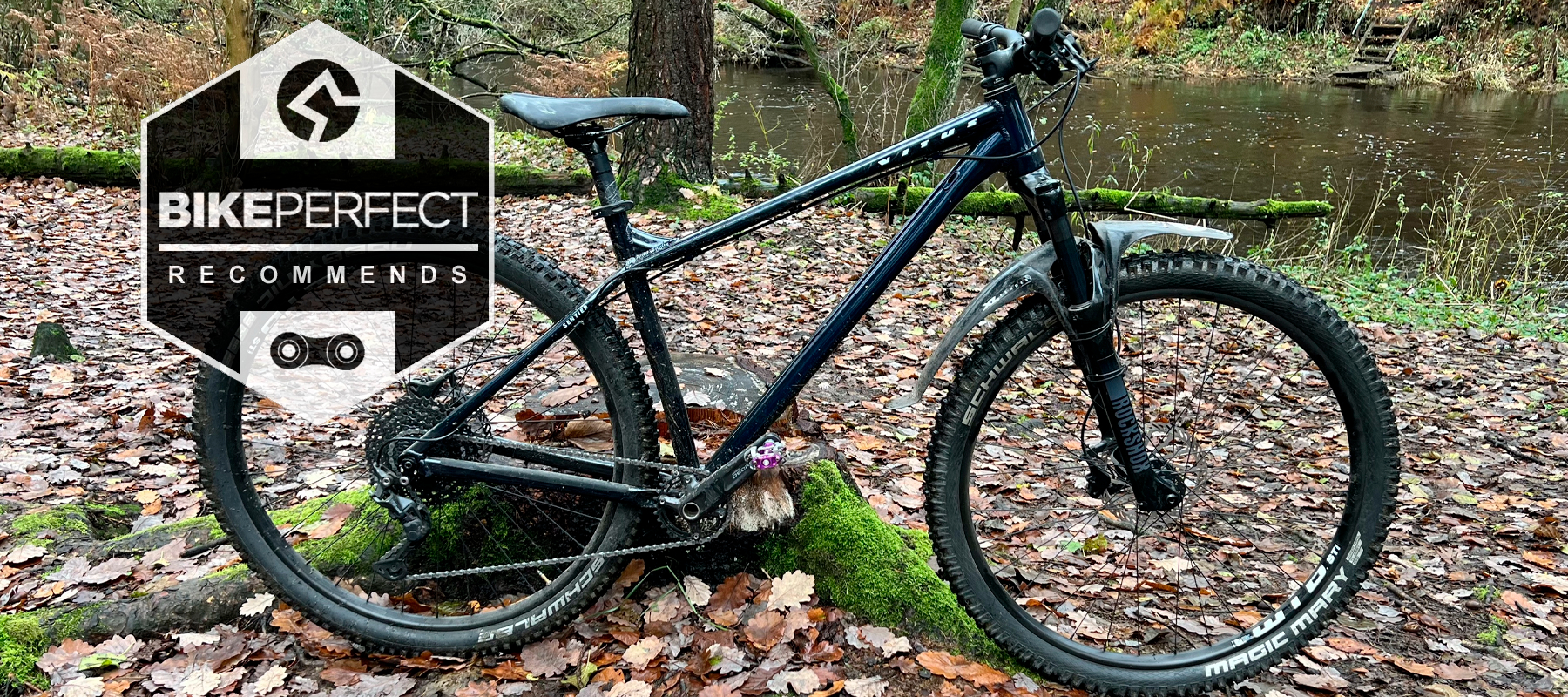Bike Perfect Verdict
Smart spec where it matters on a decent if dated frame make the Vitus Sentier a properly confident and rewarding ride with obvious upgrade potential at a price where most bikes are seriously compromised.
Pros
- +
Awesome front tire
- +
Excellent ride feel
- +
Lively, enjoyable handling
- +
Adequate fork
- +
Full size/wheel choice range
Cons
- -
Short on reach
- -
No dropper post
- -
Direct sell
- -
Uncomfortable brakes
- -
Tire drag on road
Why trust BikePerfect
The Vitus Sentier family has been among the best budget mountain bikes for several years. However, increasing price pressure means it’s only the entry level bike that still has a three-figure price tag and there are some obvious component compromises on a dated frame shape. However, there’s more than enough positive parts to mean it’s still one of the best sub £1,000 options for real mountain biking.
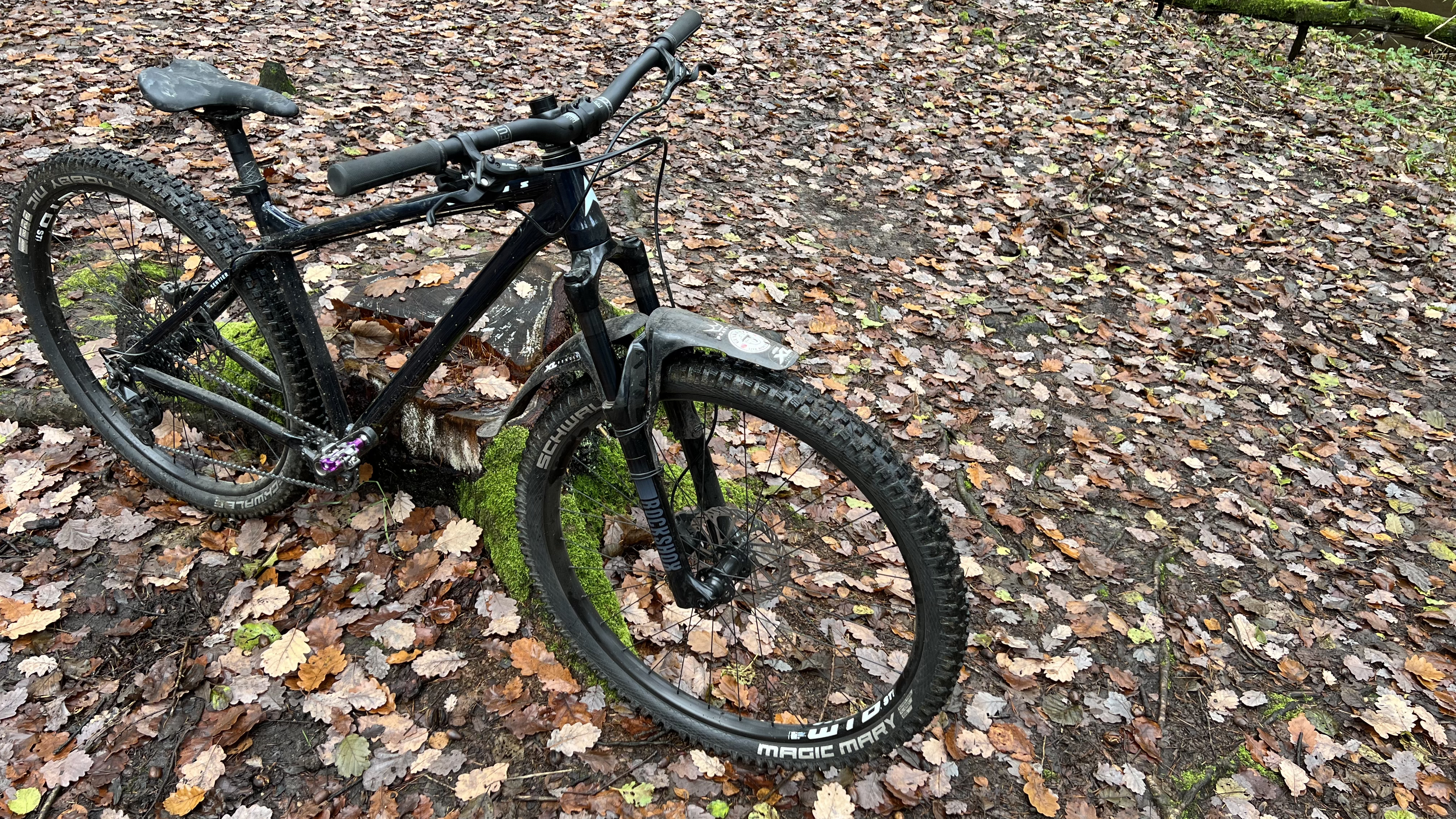
Geometry and design
The Sentier frame has been unchanged for a few years now and that shows in its geometry. Specifically the short reach (445mm on a large) which is combined with very tall seat tubes that make sizing up hard (reach is 468mm on an XL but the seat tube is 520mm). The head angle is slightly steeper than claimed at 66.9 degrees not 66.5 and the seat tube is just shy of 74 degrees. 62mm BB drop and 440mm chain stays add stability. You get the choice of 27.5in wheels and a half degree slacker steering angle on S - XL sizes and 29in wheels (which I tested) on M to XL sizes.
The bike has a classic ‘hardcore hardtail’ look too with a ‘rare at this price’ tapered head tube and a chunky supporting gusset ahead of the extended seatpost. The double-butted alloy frame has external tube shaping and while rear gear and brake cables are carried externally under the top tube, there’s internal routing for a dropper post. The frame has proper tubular braces on the stays, not just crude plates – although you don’t get rack or mudguard mounts anywhere if you’re after a ‘weekday work ride, weekend fun ride’ bike. The threaded bottom bracket shell gets ISCG chain guide tabs and the rear axle is a 148mm ‘Boost’ width bolt-through. A welcome sight when so many sub and even over £1,000 bikes have reverted to QR spindles and open dropouts to reduce costs.
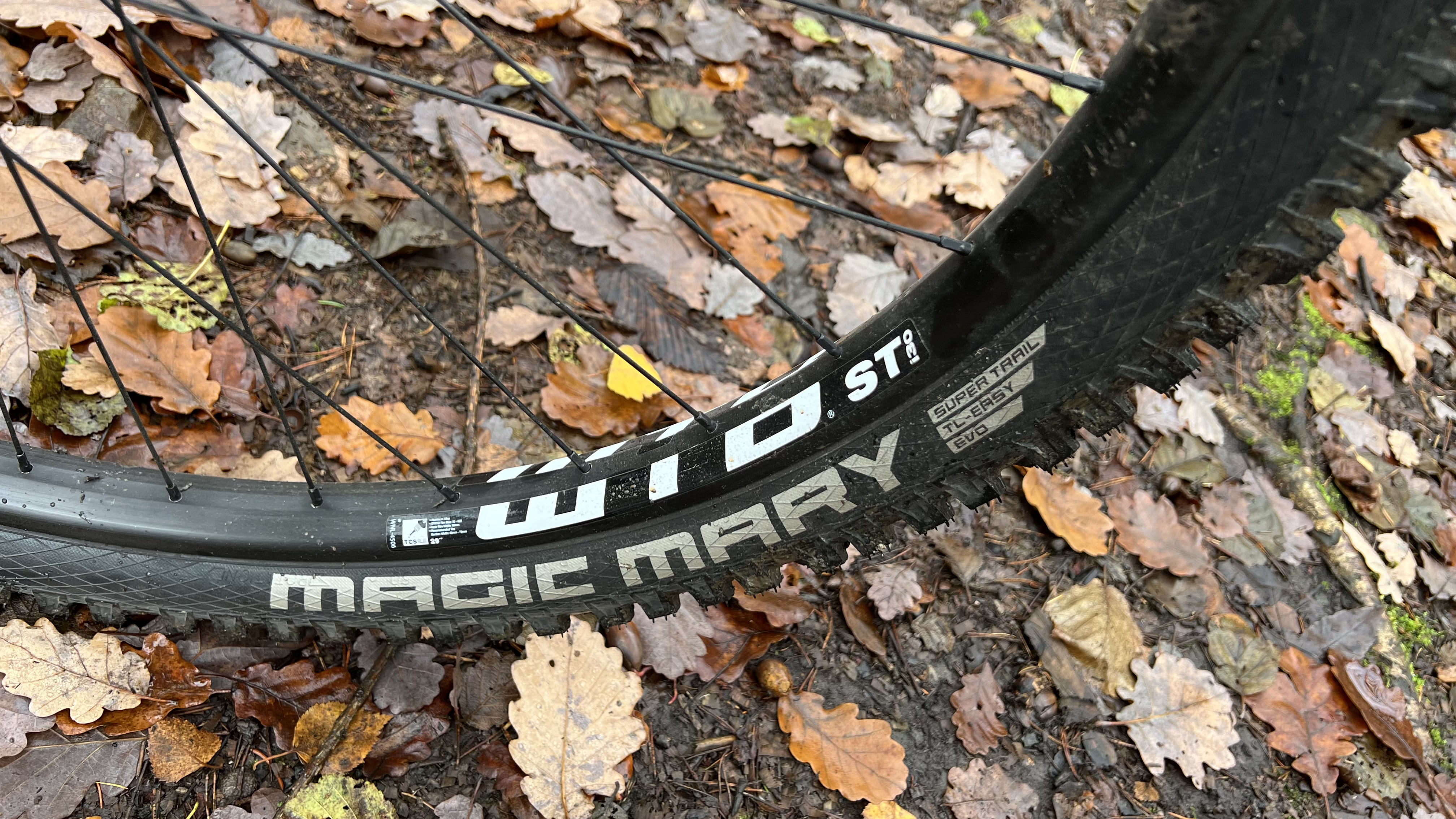
Components and build
The RockShox Recon fork uses a 110mm ‘Boost’ width bolt through-axle, not a QR. The 32mm steel legs add weight they’re stiffer than alloy stanchions of the same diameter and noticeably stiffer than 30mm legs. It also has a tapered steerer tube to match the frame. The air-spring can be altered in pressure to suit different weights and aggression levels of riders and it has externally adjustable compression plus rebound damping control.
Vitus have also seriously upgraded front end control with a top spec Schwalbe Magic Mary tire in Super Trail carcass with Addix Soft rubber. A slightly lower Performance spec Nobby Nic tire in Addix SpeedGrip compound is used at the back. Both tires are set up tubeless as standard on broad WTB i30 rims.
While it’s 10-speed rather than 11 or 12-speed, it’s still good to see a super durable Shimano Deore rear gear and trigger shifter. The chainset is Deore too which means you get a stiffer, lighter through-axle, external bottom bracket bearing design, rather than the square taper set ups found on a lot of other bikes at this price. The Sunrace cassette isn’t as smooth shifting as Shimano, but it’s OK and while the largest cog is ‘only’ 46 teeth, the front chainring is replaceable so you can fit a smaller one than the 32-tooth ring supplied if you’re struggling on steep hills.
Clarks hydraulic disc brakes with red anodized piston heads look a lot fancier than they feel, but you get a 780mm handlebar, appropriately short stem and hidden collar grips from Vitus. The quick-release cam lever for the seat post is already feeling fragile after a few weeks of testing though and the saddle is an anonymous, amorphous lump.
13.5kg for the complete bike without pedals isn’t a bad weight for the money though and the £1899 Sentier VRX, which uses the same frame, weighs under 12kg so there’s plenty of upgrade potential.
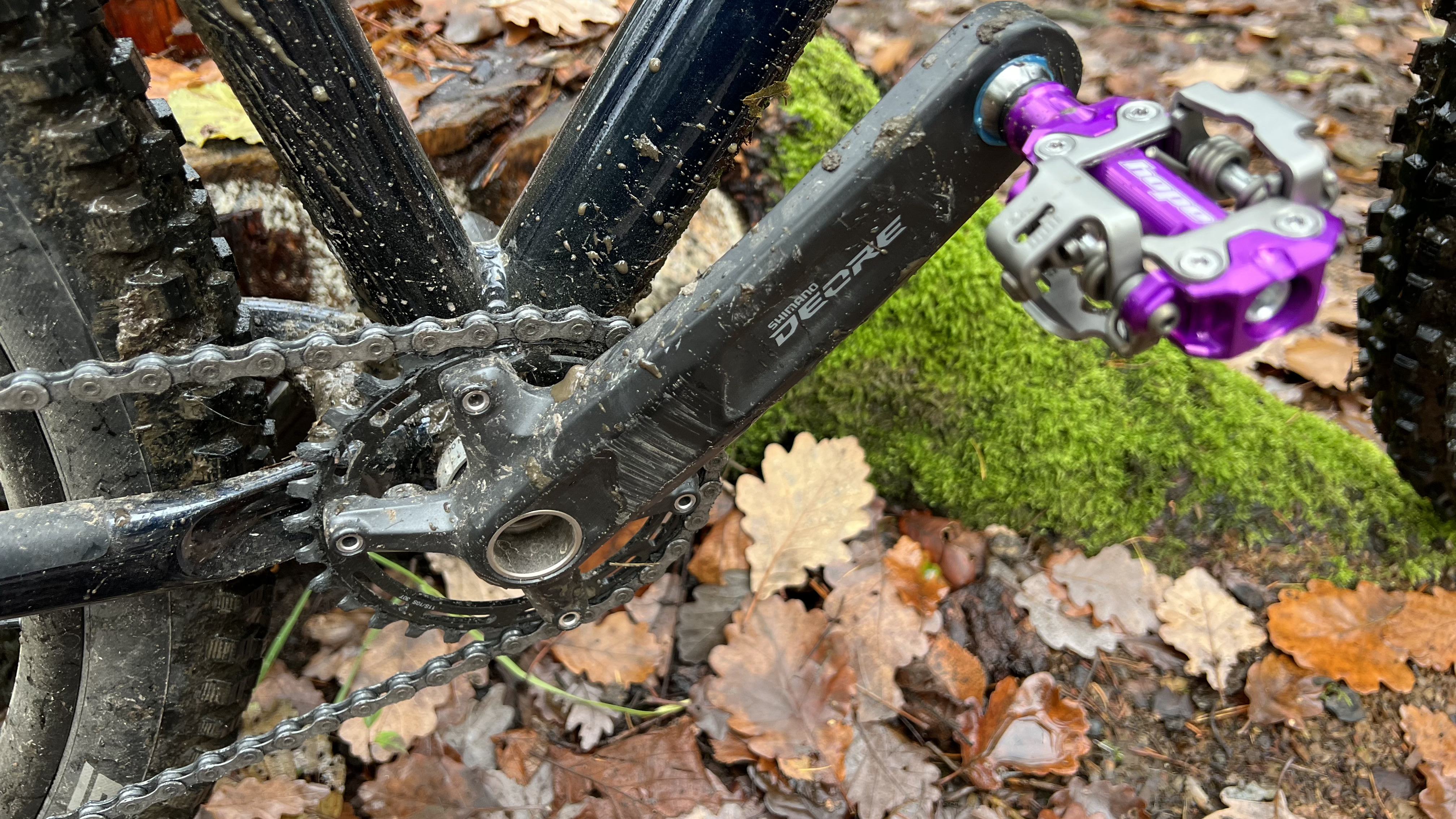
Ride, handling and performance
The great thing about the Sentier is that it doesn’t feel in desperate need of upgrading straight away. Yes, the brake levers are a bit painful and the result of pulling them is underwhelming in terms of power and feel, but they’ve been consistently reliable whenever I’ve tested them separately or on complete bike builds.
As I’m used to a dropper post, I repeatedly waved my thumb forlornly under the left hand side of the bar looking for a remote lever to get the seat out of the way on descents. If you’re new to a ‘proper’ MTB though you won’t miss what you’ve never used and Vitus regularly do ‘bundle’ offers that include a dropper post if you keep your eyes on the site.
The handling is relatively fast to turn and you need to add plenty of pressure (I ended up at 115 psi) or some ‘Bottomless Token’ volume spacers in the fork's air-spring (available separately) to stop if diving too deep into it’s travel. My sample had some clunk in the bushings when rocked on the brakes too, but once we were riding I didn’t notice it. I’ve certainly ridden much worse than the Recon SL in terms of smoothness and particularly steering precision on similar priced bikes. It’s performance is undoubtedly flattered by the Magic Mary front tire. Not only has the chunky tread pattern and soft compound rubber been a benchmark for all-weather, all-terrain control for even the most aggressive riders for years, but the sturdy Super Trail carcass sucks up impacts and stabilises ground connection brilliantly.
That meant I could push the front end of the Sentier into sketchy situations with full commitment and remain confident that everything would be fine. And while I used to say this regularly about £800-1000 bikes a few years ago, I need to make it clear just how rare a statement that is on current bikes in this category.
Normally I have to dial back expectations significantly for my own safety and the overall experience of the ride shifts to the back foot. At the same time ‘it’s not bad for the money’ or ‘you have to expect some compromises’ becomes the language of the test and to be honest I’m glad to get due diligence done and swap back to something where every wet, rooty, steep or rocky descent wasn’t scaring me sh*tless. Being able to ride my local test trails almost as hard as I normally do without worrying about the front tire sliding out without warning, the fork tripping up or the rear tyre blowing an inner tube on an edge impact was therefore a real treat and tribute to the Sentier.
It certainly went a long way to forgiving the slightly awkward bar shape and the fact it felt more like a medium sized bike than a large. It also let me appreciate that the frame actually rides really well for an affordable alloy frame. That the difference between a through axle crank and a square taper is really tangible in terms of torque transfer on technical climbs and not just in terms of much lighter weight. Even the knowledge that the bolted axles would stay secure and keep the wheels going where they should, rather than worrying whether a wheel attachment system designed for road bikes in 1926 would hold out all the way down the hill. Or to put it in simple terms, when it came to setting the fixed saddle height, for most of my riding I kept the seat slammed so I could properly throw the bike around and fully exploit it’s potential, rather that tottering round with a stick up my behind.
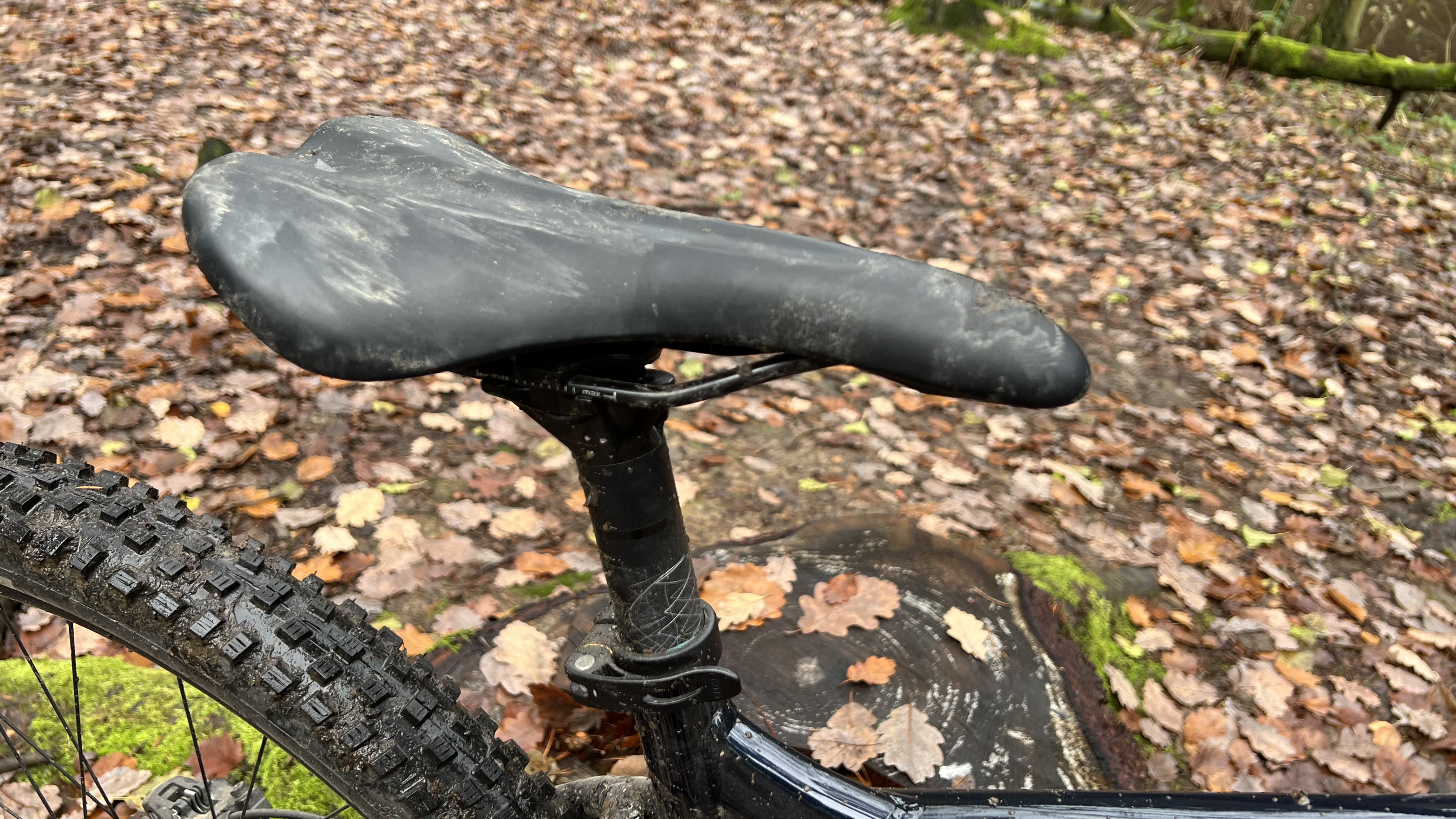
Verdict
I guess I should include a disclaimer that the sticky, slow rolling front tire and keen to party vibe of the Vitus won’t suit people who want a multi-purpose ‘soft roader’ for commutes and light trail duties. The lack of mudguard or rack mounts might put some ‘utility’ riders off too, but if you want proper MTB performance for under £1000, the Vitus Sentier 29 is one of the few options you’ve got.
The Sentier's tires and wheels give you the confidence to push hard and play with the trails which is a great thing. They really mask the shortcomings of the adequate fork, bearable brakes and a ride position that’s definitely on the short/tall side too, even if the bike does lack a dropper post.
Test conditions
- Trails: blue and red grade trail center routes plus natural woodland singletrack
- Conditions: dry and rain soaked
Tech specs: Vitus Sentier 29
- Discipline: Trail
- Price: £949
- Head angle: 67 degrees
- Frame material: 6061 alloy
- Fork: RockShox Recon Silver RL, 42mm offset, 130mm travel
- Sizes: XS, S, M, L, (tested) XL
- Weight: 13.5kg (L without pedals)
- Wheel size: 29in
- Gears: Shimano Deore rear mech and 10sp shifter, SunRace 11-46t cassette
- Drivetrain: 1x10 Shimano Deore M5100 32T
- Brakes: Clarks M2 hydraulic disc brakes with 180mm rotors.
- Tires: Schwalbe Magic Mary 29 x 2.4in Super Trail Evo Addix Soft front, Nobby Nic 29 x 2.3in rear
- Wheels: Vitus hub and WTB i30 TCS rims
- Cockpit: Nukeproof Neutron V2 Riser 780 x 31.8mm bar, Vitus 50 x 31.8mm stem
- Seatpost: Vitus alloy 31.6mm
- Saddle: Vitus

Guy Kesteven has been working on Bike Perfect since its launch in 2019. He started writing and testing for bike mags in 1996. Since then he’s written several million words about several thousand test bikes and a ridiculous amount of riding gear. He’s also penned a handful of bike-related books and he reviews MTBs over on YouTube.
Current rides: Cervelo ZFS-5, Specialized Chisel, custom Nicolai enduro tandem, Landescape/Swallow custom gravel tandem
Height: 180cm
Weight: 69kg
